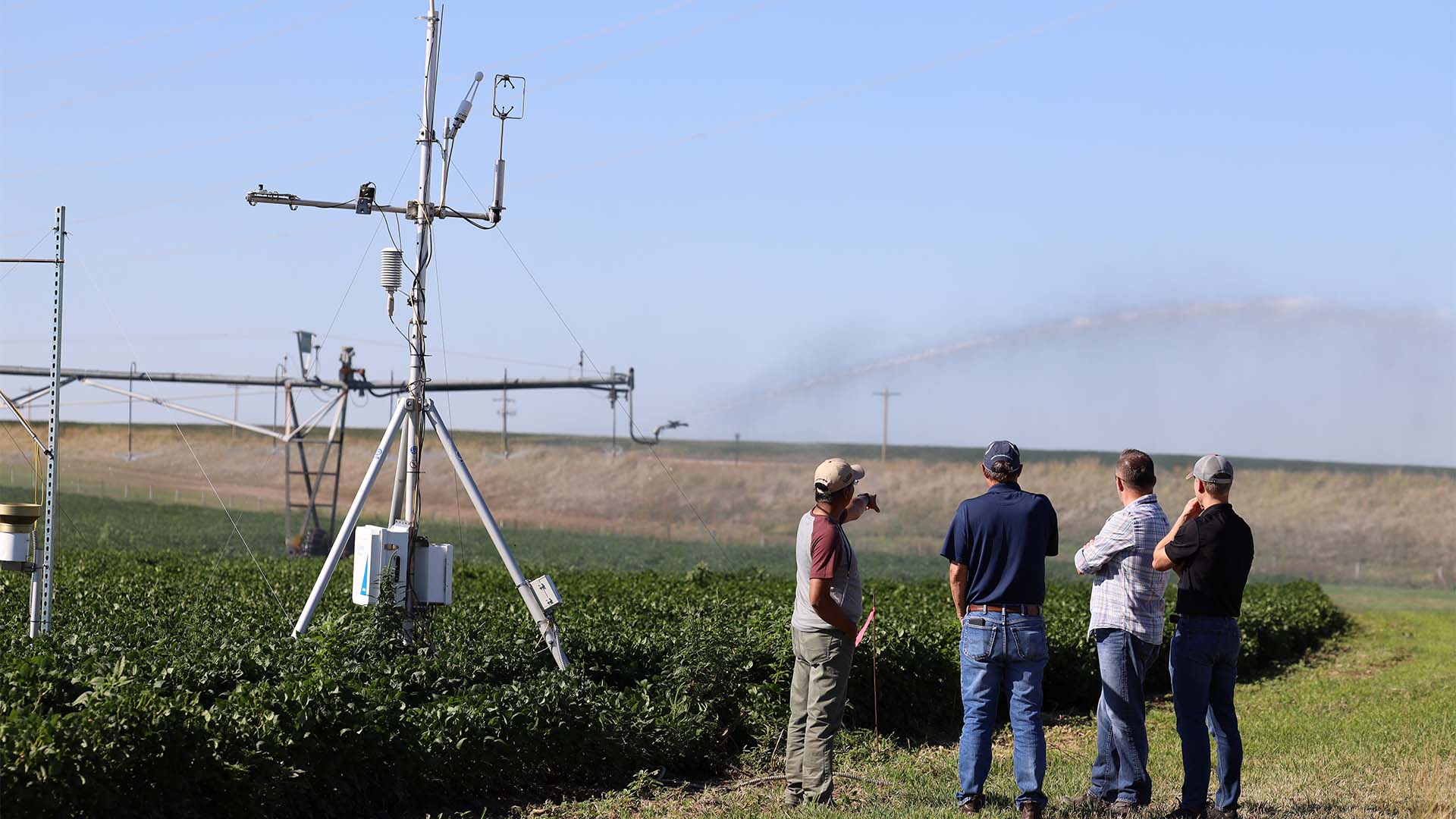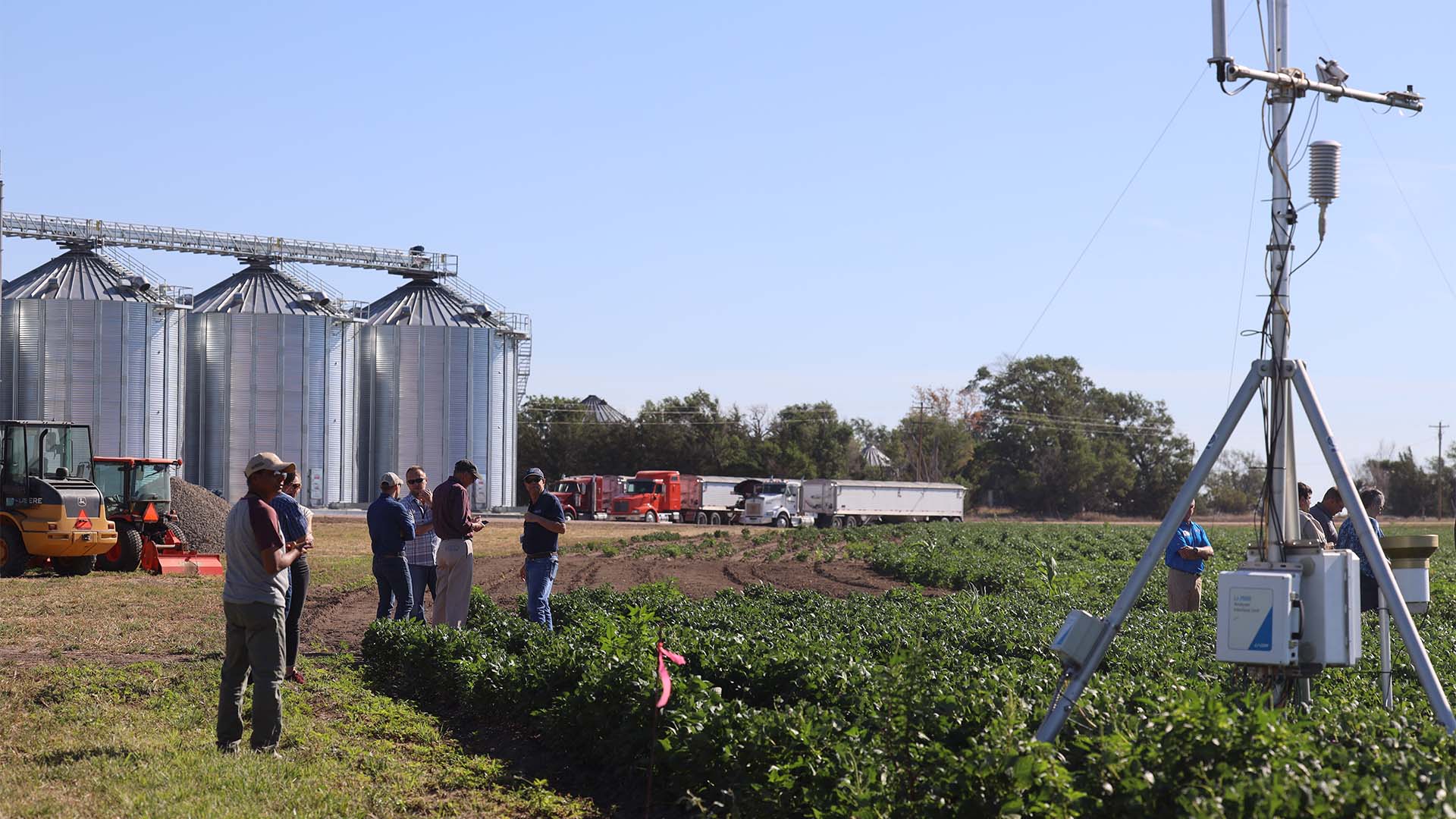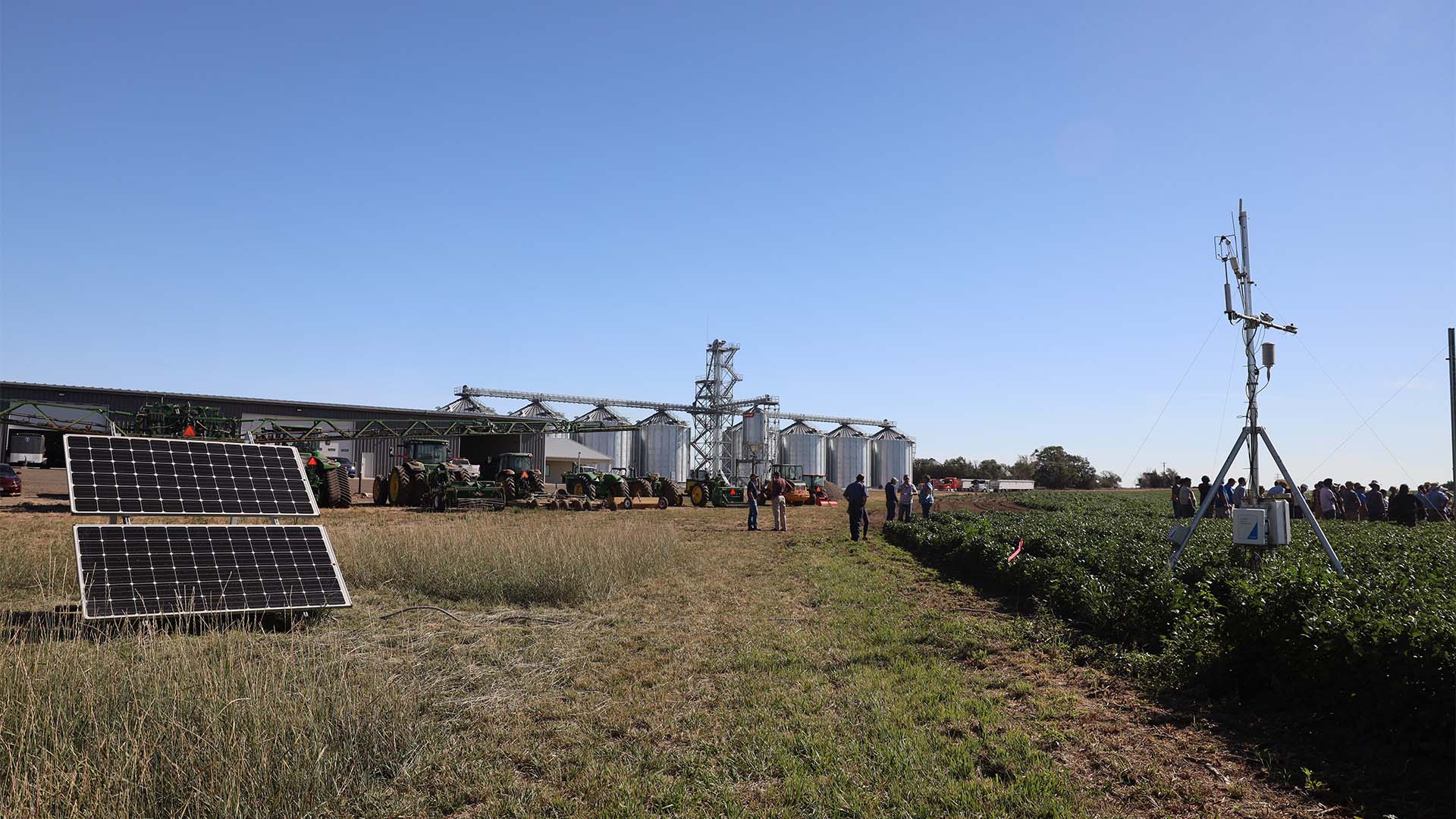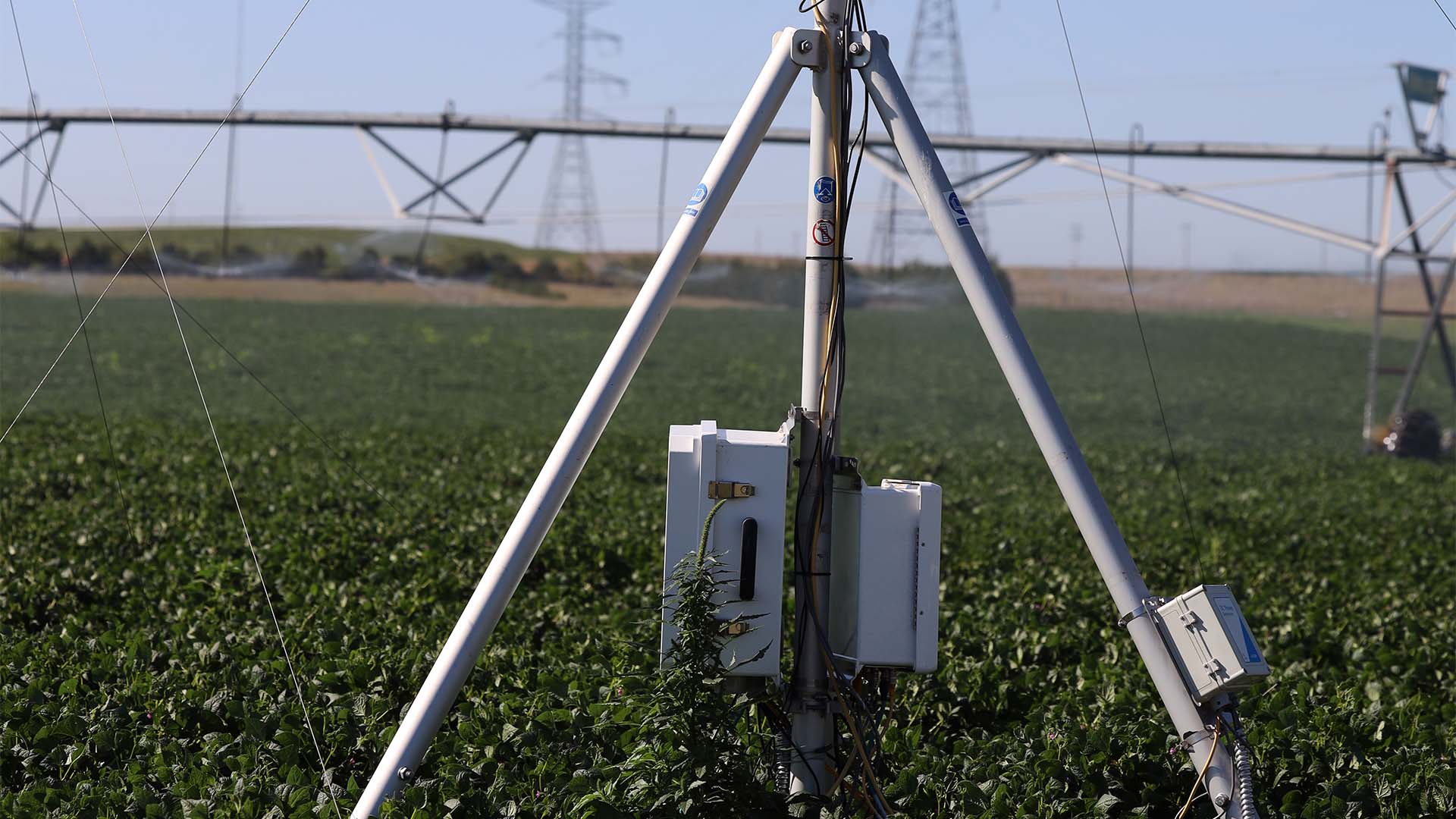DWFI offers suite of tools to improve irrigation water use and agricultural productivity
DWFI continually explores new technology and enhances existing tools to help farm producers and water managers address complex challenges to water use. Climate change and unpredictable seasonality; as well as soil moisture availability, crop water use and nutrient variability, are all factors that can affect yields and profitability.
Together with partners throughout the U.S. and internationally, DWFI is researching ways to help growers around the world achieve the critical food production goals needed, while overcoming environmental challenges and keeping farms profitable.
Parallel 41 Flux Network expands to include new towers, new capabilities
DWFI uses its Parallel 41 Flux Network — a series of eddy covariance (EC) flux towers across the central plains of the United States — to determine movement of water vapor and other gasses in cropped fields. The variance in this movement and the composition of the air helps measure evapotranspiration (ET) more exactly. Accurate and timely ET data ultimately helps growers to precisely apply the amount of irrigation water that crops need, when they need it, to achieve the best possible yields.
The data collected from the suite of flux towers is also being used to ground truth satellite data generated by GloDET - Global Daily Evapotranspiration, a free website portal to view and download global daily ET spatial datasets, estimated using the ALEXI model, developed by partners at the U.S. Department of Agriculture’s Agricultural Research Service.
The information from models, data collection and analysis is freely shared and has a powerful impact on improving water accounting, water productivity, irrigation scheduling, variable rate irrigation scheduling and drought monitoring.
In 2021, DWFI added two additional flux towers in Nebraska. One is in the Upper Republican NRD area to evaluate water balance and help estimate the recharge rate for farmers who are not irrigating. This data will also help the Upper Republican NRD develop effective and fair pumping policies. The other new tower was installed in the Lower Republican River Basin, measuring the range of precipitation and soil moisture, which supports better irrigation decisions to meet the area’s specific soil and crop conditions. A third tower was installed in the Middle Republican NRD during the 2022 season.
-

Eddy covariance flux towers are collecting data on a field near Sutherland, Nebraska to ground truth satellite data. Photo credit: DWFI
-

Eddy covariance flux towers are collecting data on a field near Sutherland, Nebraska to ground truth satellite data. Photo credit: DWFI
-

Eddy covariance flux towers are collecting data on a field near Sutherland, Nebraska to ground truth satellite data. Photo credit: DWFI
-

Eddy covariance flux towers are collecting data on a field near Sutherland, Nebraska to ground truth satellite data. Photo credit: DWFI
Flux towers also measure greenhouse gas emissions
The U.S. Department of Energy awarded a $3 million grant to DWFI and University of Nebraska researchers and another half-million dollars of matching funds to add gas analyzers to three flux towers in Nebraska, Iowa and Minnesota to measure atmospheric carbon dioxide, nitrous oxide and methane fluxes. The towers will also measure soil emissions of these gases using automated soil chambers and additional gas analyzers.
These technologies -- combined with extensive soil and plant sampling for nutrients, carbon and nitrogen -- allow researchers to estimate a complete carbon balance through the use of lifecycle analysis models. In turn, these models provide data showing how successful various production systems are at minimizing harmful effects of nitrous oxide emissions and their efficiency in fixing carbon. This information can provide a profit incentive in the form of carbon credits to the farmers in future carbon markets.
The combination of greenhouse gas-measuring technology and modeling will lead to an increase in overall profitability as farmers adopt more efficient production systems in fixing carbon and management approaches that reduce emissions. Widespread adoption of efficient production systems is important because mass producer adoption gives us the best chance to improve water productivity significantly and sustainably while reducing the carbon footprint, improving food production and environmental quality in Nebraska and other states. Furthermore, once the technology and modeling are completed, tested and perfected, they can be applied to production agriculture in other parts of the U.S. and the world.
DAWN: the Dashboard for Agricultural Water Use and Nutrient Management
Another important tool under development is the Dashboard for Agricultural Water Use and Nutrient Management(DAWN) project, which aims to provide farmers with a powerful, predictive decision-making support tool to sustain food and energy crop production. DAWN is supported by the U.S. Department of Agriculture – National Institute of Food and Agriculture and is a collaborative effort among several universities and organizations led by the University of Maryland.
DAWN will incorporate modeling previously developed by DWFI’s Director of Research Christopher Neale: the Spatial EvapoTranspiration Modeling Interface (SETMI) and GloDET tools. SETMI uses remote sensing via satellite, airborne or unmanned aerial system platforms to estimate ET, maintain a soil water balance in the root zone of the crop and predict irrigation needs.
Through DAWN, collaborators hope to provide an accurate set of seasonal climatic forecasts from one to nine months in advance, as well as one to six-day weather forecasts during the growing season. Both long- and short-term reliable forecasts are critical to growers and can translate into concrete decision-support tools to help them optimize the application of nitrogen-based fertilizers and maintain or increase crop productivity while minimizing environmental impacts.
The DAWN project is being designed with a user-friendly interface, providing recommended actions with an irrigation scheduling tool based on tailored input. It will also help farmers manage risk by providing planning scenarios that allow producers to explore how crops will fare under different conditions. Altogether, this system will provide crucial information to producers in understanding costs and benefits of different management strategies, help to close water usage gaps and make significant advances in advancing food security.
FY 2022 Annual Report
- Overview
- Letter from the Executive Director
-
Research and Policy
-
Nebraska + Regional
- DWFI offers suite of tools to improve irrigation water use and agricultural productivity
- Understanding groundwater markets and transfers in Nebraska
- Water management for improving water use, sustainability
- Research looks to control nitrate leaching, protect Nebraska groundwater
- DWFI researching solutions, fostering communication regarding AltEn environmental crisis in Mead, Nebraska
- Nitrate Strategy Groups release calls for action
- Mapping geographic heat inequities in urban areas
-
Global + National
- New report explores the business ecosystem for smallholder irrigation in Rwanda
- Visit to Nebraska results in water management partnership with Brazil
- New study shows economic impact of the irrigation equipment and services industry
- DWFI and Mammoth Water launch report of water market readiness
- USDA partnering with Nebraska Water Center to enhance modeling system
- Faculty Fellows
-
Supported Students
- Water for Food Research Forum showcases exciting student work
- DWFI welcomes new round of student support recipients
- Student's fertigation startup awarded first Husker Venture Fund investment
- Four DWFI supported students receive doctoral degrees
- Nebraska researchers are following the water
- Heeren Inspires Students through Irrigation Field Course
-
Nebraska + Regional
-
Communication, Education + Outreach
- DWFI reconnects with international partners and projects
- Nebraska Water Center seminars focus on hydro-tourism, economic development in Nebraska
- Nebraska Water Center conference held in Scottsbluff
- Virtual forum broadens institute’s reach
- Aquifer recharge project in Nebraska featured in international publication
- Digital growth: Water for Food Podcast and online engagement
- Development
-
Photo essays
- DWFI discusses water management with delegation from Kenya
- DWFI and Nebraska Water Center engage with attendees at UNL East Campus Discovery Days
- DWFI and Nebraska Water Center participate in UNL Sustainability Kickoff event
- DWFI hosts students Faculty Fellow for fall welcome event
- DWFI sponsors annual Earthstock event on University of Nebraska Lincoln campus
- Resources
- Search
FY 2022 Annual Report
- Overview
- Letter from the Executive Director
-
Research and Policy
-
Nebraska + Regional
- DWFI offers suite of tools to improve irrigation water use and agricultural productivity
- Understanding groundwater markets and transfers in Nebraska
- Water management for improving water use, sustainability
- Research looks to control nitrate leaching, protect Nebraska groundwater
- DWFI researching solutions, fostering communication regarding AltEn environmental crisis in Mead, Nebraska
- Nitrate Strategy Groups release calls for action
- Mapping geographic heat inequities in urban areas
-
Global + National
- New report explores the business ecosystem for smallholder irrigation in Rwanda
- Visit to Nebraska results in water management partnership with Brazil
- New study shows economic impact of the irrigation equipment and services industry
- DWFI and Mammoth Water launch report of water market readiness
- USDA partnering with Nebraska Water Center to enhance modeling system
- Faculty Fellows
-
Supported Students
- Water for Food Research Forum showcases exciting student work
- DWFI welcomes new round of student support recipients
- Student's fertigation startup awarded first Husker Venture Fund investment
- Four DWFI supported students receive doctoral degrees
- Nebraska researchers are following the water
- Heeren Inspires Students through Irrigation Field Course
-
Nebraska + Regional
-
Communication, Education + Outreach
- DWFI reconnects with international partners and projects
- Nebraska Water Center seminars focus on hydro-tourism, economic development in Nebraska
- Nebraska Water Center conference held in Scottsbluff
- Virtual forum broadens institute’s reach
- Aquifer recharge project in Nebraska featured in international publication
- Digital growth: Water for Food Podcast and online engagement
- Development
-
Photo essays
- DWFI discusses water management with delegation from Kenya
- DWFI and Nebraska Water Center engage with attendees at UNL East Campus Discovery Days
- DWFI and Nebraska Water Center participate in UNL Sustainability Kickoff event
- DWFI hosts students Faculty Fellow for fall welcome event
- DWFI sponsors annual Earthstock event on University of Nebraska Lincoln campus
- Resources
- Search
Related Articles
DWFI reconnects with international partners and projects
DWFI has largely resumed its travel to reconnect and engage with both international and U.S. partners in person.
Nebraska Water Center conference held in Scottsbluff
The Nebraska Water Center (NWC) trekked across the state to host its annual Nebraska Water Conference in 2021.
Aquifer recharge project in Nebraska featured in international publication
A new book published by UNESCO includes a project from Nebraska’s Central Platte Valley as a case study in effective managed aquifer recharge (MAR).
COOKIE USAGE:
The University of Nebraska System uses cookies to give you the best online experience. By clicking "I Agree" and/or continuing to use this website without adjusting your browser settings, you accept the use of cookies.

